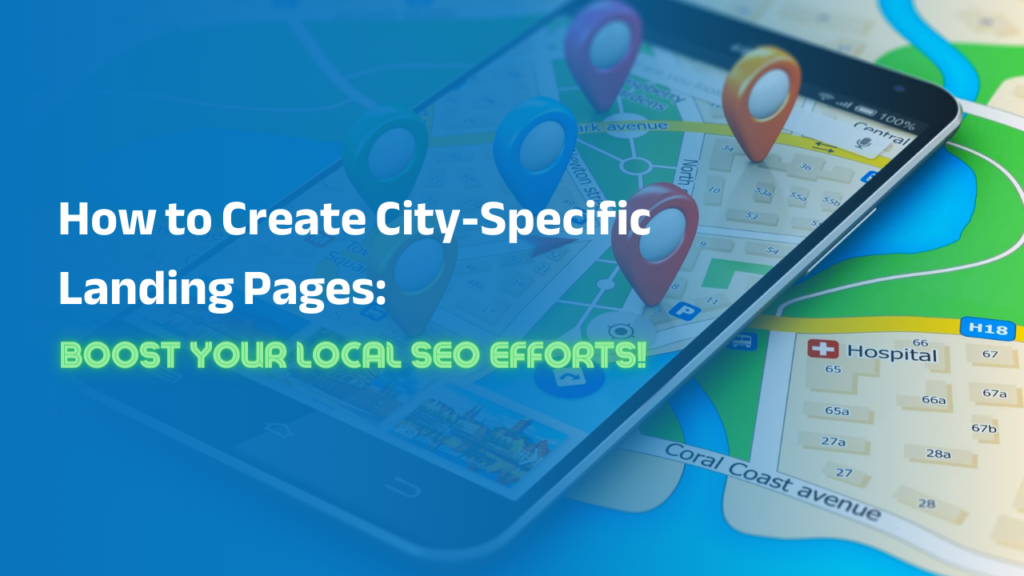Welcome to our guide on How to Create CIty-Specific Landing Pages to strengthen your local SEO strategy! Whether you run a small business or a large corporation, optimizing your website for local searches can significantly boost your online visibility and attract more potential customers in specific cities or regions. In this article, we’ll provide you with practical tips and best practices for crafting compelling city-specific landing pages and leveraging them to enhance your overall SEO performance.
Understanding the Importance of City-Specific Landing Pages
If you’re targeting customers in different cities, having dedicated landing pages for each location can be a game-changer. Why? Because search engines prioritize local results, and city-specific pages help you tailor your content to local audiences, thereby increasing your chances of being found by potential customers in those areas. These pages can also improve the user experience by delivering relevant information based on the user’s location, effectively driving higher engagement and conversion rates.
Key Elements of an Effective City-Specific Landing Page
When creating landing pages for specific cities, it’s crucial to incorporate the following elements:
| Element | Description |
|---|---|
| City-Specific Keywords | Include relevant keywords that incorporate the city’s name to enhance local search visibility. |
| Local Content | Provide localized content such as testimonials, case studies, or news related to the specific city. |
| Contact Information | Display accurate contact details, including the address, phone number, and operating hours for the targeted city. |
| Google Maps Integration | Embed a Google Maps widget to make it easier for visitors to locate your business in the respective city. |
Optimizing City-Specific Landing Page Content
When crafting content for your city-specific landing pages, it’s essential to keep the following best practices in mind:
- Be Location-Specific: Tailor your content to address the unique needs and interests of the targeted city’s residents.
- Avoid Duplicate Content: Ensure that each landing page offers unique and valuable information to avoid duplicate content issues.
- Use Geotargeted URLs: Incorporate the city name in the page’s URL to signal its relevance to search engines and users.
- Include Local Testimonials: Feature testimonials from satisfied customers in the specific city to build trust and credibility.

Credit: www.linkedin.com
Technical Optimization for City-Specific Pages
From a technical standpoint, optimizing your city-specific landing pages involves several key considerations:
- Meta Tags: Craft unique meta titles and descriptions that include the city name and relevant keywords.
- Schema Markup: Implement local business schema markup to provide search engines with specific details about your location.
- Page Load Speed: Ensure fast loading times for an improved user experience, which can positively impact your SEO rankings.
- Mobile Responsiveness: Optimize your landing pages to be fully functional and visually appealing across various devices, especially mobile phones.
Link-Building Strategies for Local SEO
To strengthen the authority and relevance of your city-specific landing pages, consider implementing the following link-building tactics:
- Local Citations: Ensure your business is listed accurately in local directories, such as Google My Business, Yelp, and Yellow Pages.
- Local Backlinks: Seek opportunities to acquire backlinks from local news sites, community organizations, and other businesses within the targeted city.
- Guest Blogging: Contribute guest posts to local websites or blogs to earn links back to your city-specific landing pages.
Measuring Success and Making Adjustments
Once your city-specific landing pages are live, it’s important to monitor their performance and make necessary adjustments to improve their effectiveness. Consider using tools like Google Analytics and Google Search Console to track organic traffic, user behavior, and keyword rankings. Based on the data collected, you can refine your content, optimize for better user engagement, and continue enhancing your local SEO strategy to achieve sustainable results.
Frequently Asked Questions Of How To Create City-specific Landing Pages: Boost Your Local Seo Efforts!
How To Create City-specific Landing Pages?
Creating city-specific landing pages can greatly benefit your local SEO strategy. Here are some FAQs and their answers to guide you through the process:
Q1. Why Should I Create City-specific Landing Pages?
City-specific landing pages allow you to target and engage local audiences effectively. They improve your chances of ranking higher in local search results and attract highly relevant traffic to your website.
Q2. How Do I Determine The Cities To Target?
Start by conducting thorough keyword research to identify the cities with high search volumes and low competition. Consider your target audience, business goals, and local market trends when selecting the cities to target.
Q3. What Components Should I Include In A City-specific Landing Page?
A city-specific landing page should include location-specific keywords, relevant content, a unique value proposition tailored to the city, contact information, testimonials, and localized images.
Conclusion
Creating city-specific landing pages is a powerful way to amplify your local SEO efforts and connect with potential customers in specific geographic areas. By incorporating the essential elements, optimizing your content, and implementing effective link-building strategies, you can significantly enhance your website’s visibility and drive targeted traffic to your business. Remember, local SEO is an ongoing process, so continuously evaluate and refine your city-specific landing pages to maintain and improve your competitive edge in local search results.

